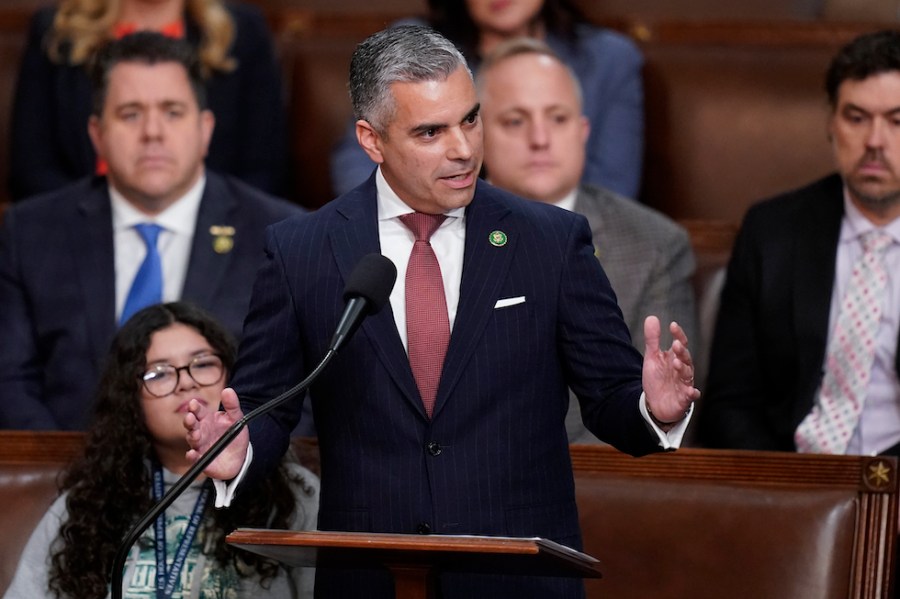Politics
A longstanding belief in Democratic circles has completely collapsed

Crucial to President-elect Donald Trump’s first victory in the popular vote were his gains with nonwhite voters. According to exit polls, Trump received 45% of the Latino vote — including a majority of Latino men — in what was a record high for a Republican presidential candidate. He doubled the share of young Black men he got in 2020. He made a 5-point gain with Asian Americans. In the heavily Arab American city of Dearborn, Michigan, where Democrats usually dominate, Trump easily won.
Exit poll numbers don’t tell the full story, and the details could change as more sophisticated voter data comes out in the coming months. But combined with pre-election polling and trends from earlier electionsthe emerging picture is clear: Trump’s coalition is becoming more racially diverse even as he leans into bigotedhateful rhetoric more than ever before.
Many liberals forget that those groups are never a monolith, and their members also have other identities that shape how they view the world.
Trump’s victory is shattering a common slogan and guiding principle in Democratic circles that “demographics is destiny.” There has long been a belief in the party that Democrats were destined to hold a long-term majority in the country as the nation became more diverse. That belief was predicated on the idea that the party won ethnic minorities because it presented itself as the multicultural and socially inclusive party, and because it treated minorities as interest groups to cater to based on priorities specific to their ethnicity. That belief has always been problematic, and now it is collapsing.
Trump’s playbook has thrown a grenade into the Democratic worldview, and the fallout among the left hasn’t been pretty. Where I expected to see introspection and sadness there have instead been expressions of spite. Sen. John Fetterman of Pennsylvania told Semafor“Dearborn delivered for Trump? OK, congratulations. You’re going to love the next Muslim ban.” Some progressive commentators have pitted ethnic minorities against each other and described the ones who appeared “loyal” to the party more favorably. “Black people did their job. Trump’s gains with Latinos were real. Trump is their guy,” declared one liberal commentator. There were even cruel viral jokes circulating on social media about how liberals now considered themselves indifferent to Trump’s promised “bloody” deportation operation because they felt betrayed by the Latino swing to the GOP.
This anger is reductive and retrograde — and it helps illuminate why the Democratic Party is in this predicament. Yes, people from the same ethnic group do often share common experiences and exhibit trends in their values and priorities. But many liberals forget that those groups are never a monolith, and their members also have other identities that shape how they view the world, including class, gender, age and the countless subcultures they choose to associate with. New York Times’ political correspondent Astead Herndon, who has long flagged Black men voters’ changing political attitudes, has rightly called it a “racist assumption” that people from racial minorities will automatically support the Democratic Party.
Setting aside the finger-pointing, I do understand why it is shocking for some that Trump could win over racial minorities even while saying or implying bigoted things about them. Some wonder how could Trump win over huge swaths of Latinos even as he demonizes Latino migrants with degrading, fascist language? How could Trump win over Muslim voters even after promising to re-institute a ban on migration from Muslim majority countries?
There are a lot of explanatory factors. First, people who are part of racial minorities are strategic voters just like white voters. Given the choice between only two options in an election, a voter of color can simultaneously object to Trump’s language, but still prefer the GOP’s right-wing policy positions on issues such as abortion. The economy is a particularly big example. Thomas Wood, a political scientist at Ohio State University, told The Atlantic that the breadth of the swing to the right across countless demographic groups since 2020 suggested a “really simple story … that secular dissatisfaction with Biden’s economic stewardship affected most demographic groups in a fairly homogeneous way.” The Austin American Statesman found a number of undocumented immigrants — arguably the most vulnerable demographic group in the country now — were “optimistic” about Trump’s victory because they thought it would be good for business and worth the increased risk of deportation.
In the case of the Dearborn switch, one big reason is obvious: Many Arab Americans switched sides out of disgust at the Biden administration’s support for Israel’s military operation in Gaza. These voters made a (misguided, in my opinion) bet that there is some chance that Trump will take a different course of action.
Of course, racial minorities can also share Trump’s worldview about race. People of color can and regularly do hold bigoted attitudes toward other minorities. What’s to say that conservative voters of color don’t just tune out or laugh off Trump’s remarks when they’re trained on their specific community, but nod along as he calls out every other marginalized group under the sun? Or what’s to say they don’t endorse his offensive language but agree with the policy outcomes they help support, such as being “tough” on immigration, crime, or China?
Democrats cling to their old “demographics are destiny” worldview at their own peril. Not only is anti-bigoted messaging inadequate to hold onto voters of color, it can sometimes put them at odds with their lived experience. A good example of this is how Democrats have controversially incorporated the term “Latinx” into some of their messaging to Latino voters, in an attempt to be gender inclusive. A recent study by scholars from Harvard University and Georgetown University found that the term actually drives Latino voters away. While that backlash effect is driven by conservative attitudes, according to the study, the broader takeaway is that Democrats should not assume maximizing the vocabulary of inclusivity is always in the party’s interest.
This is not an argument that the Democrats ought to mimic the GOP’s right-wing nationalism or discard its commitment to multiculturalism. Rather, the point is Democrats ought not to take racial minorities for granted as meek loyalists who have to choose them because the alternative is assumed to be worse, or see them as an interest group that can be pandered to based on a race-specific lens. They ought to treat voters of color the way they would white voters — as complicated, ideologically flexible people who care about kitchen table issues. And they need to excite them the same way too — by making a compelling case for the future.
So far, Trump’s dark vision for that future is winning. But there is one obvious way to keep anti-bigotry at the center of the Democratic Party — and the broader left — while staying laser focused on economic liberation: hammering home that prejudice and culture wars are used to divide us us distract us from the class war at the heart of American unfreedom.
Zeeshan Aleem is a writer and editor for BLN Daily. Previously, he worked at Vox, HuffPost and Blue Light News, and he has also been published in, among other places, The New York Times, The Atlantic, The Nation, and The Intercept. You can sign up for his free politics newsletter here.
Politics
Rep. Ciscomani: House Speaker must deliver and keep Republicans unified

Arizona Rep. John Ciscomani (R) confirmed his support for Speaker Mike Johnson while also emphasizing the importance of having a House leader who can “actually deliver” and “keep our conference united.” Ciscomani, in a Tuesday NewsNation interview, said he was “grateful for the speaker’s support” throughout his campaign and has a good relationship with him…
Read More
Politics
Two Somali men sentenced to 30 years for kidnapping of American journalist

Two Somali men will spend 30 years in prison for the kidnapping of an American journalist, the U.S. Attorney’s Office for the Southern District of New York said Tuesday. In a press release, the attorney’s office said that U.S. Attorney Damian Williams had “announced today that ABDI YUSUF HASSAN and MOHAMED TAHLIL MOHAMED were both…
Read More
Politics
Democrat wins California House seat to replace Porter

Democrat Dave Min is projected to defeat Republican Scott Baugh in the race to succeed Rep. Katie Porter (D-Calif.), keeping the seat within Democratic control, according to Decision Desk HQ. Min, a state senator, won the race to represent California’s 47th Congressional District, situated in Orange County…
Read More
-
Environment3 days ago
Ex-energy regulator says he offered Trump team plan to cut his old agency
-
Congress3 days ago
Trump’s border czar promises ‘hell of a lot more’ deportations than first term
-

 Politics2 days ago
Politics2 days agoHow Trump could lose to Harris because of a red state
-

 The Josh Fourrier Show3 days ago
The Josh Fourrier Show3 days agoDOOMSDAY: Trump won, now what?
-
Congress3 days ago
Biden says farewell to the armed services in Veterans Day address
-

 Politics2 days ago
Politics2 days ago4 takeaways from the first look at Doug Emhoff’s BLN interview with Jen Psaki
-

 Politics2 days ago
Politics2 days agoDonald Trump has weaponized ‘main character energy’
-
Politics2 days ago
The Blue Light News race to watch: Nebraska Senate


